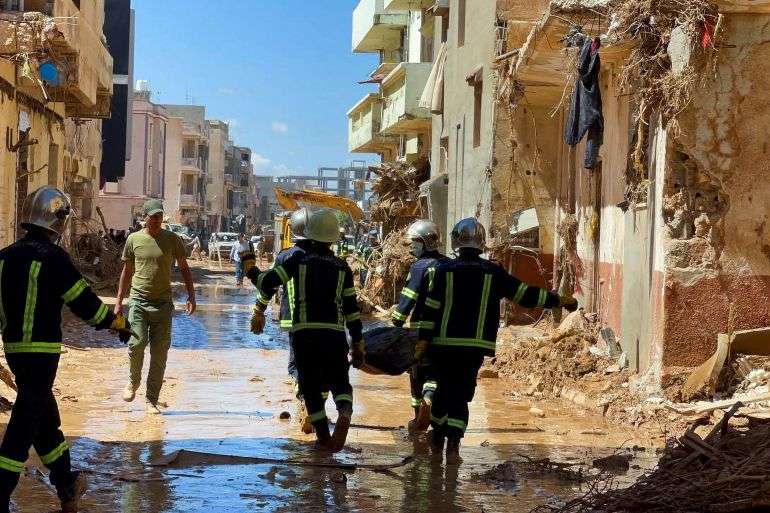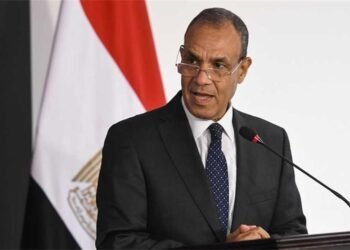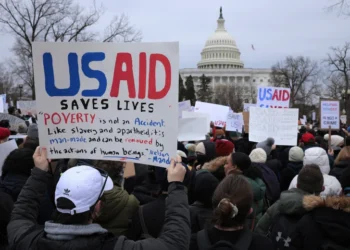The death toll in Libya’s flooded city of Derna has soared to 11,300.
This marks an alarming increase as health authorities previously put the death toll in Derna at 5,500.
Marie el-Drese, Secretary-General of the International Federation of Red Cross and Red Crescent Societies (IFRC) Libya, disclosed that another 10,100 people are reported missing in Derna.
Meanwhile, search efforts continue as Rescuers search through mud and wreckage.
According to Libyan Health Minister, Othman Abduljalil, the flood caused by Storm Daniel on Sunday, September 10, 2023, night also killed about 170 people in other parts of eastern Libya, including the towns of Bayda, Susa, Um Razaz and Marj.
The UN’s World Meteorological Organization Chief, Petteri Taalas said earlier that many deaths could have been avoided if early warning and emergency management systems had functioned properly in Libya.
Taalas opined that with better coordination, “they could have issued the warnings and the emergency management forces would have been able to carry out the evacuation of the people, and we could have avoided most of the human casualties.”
In addition, Anas El Gomati, Founder and Director of the Sadeq Institute, laid the blame on the eastern authorities for neglecting Derna’s critical infrastructure and maintenance.
“Corruption and financial mismanagement are the cause behind failing infrastructure that has plagued Libya for decades,” he said.
“But the successive regimes are culpable, and it is the military investment authority that has cannibalised Libya’s public infrastructure in the east, destroying it to be smuggled and sold for scrap metal.”
Anas El Gomati
WHO And Other Aid Groups Urge Libya To Halt Mass Burials
Also on Friday, The International Federation of the Red Cross and Red Crescent Societies (IFRC), the International Committee of the Red Cross (ICRC) and the World Health Organization (WHO) urged Libyan authorities to stop burying flood victims in mass graves.
In a statement, the organizations noted that the approach of hastily burying bodies in mass graves “can be detrimental to the population.”
“We urge authorities in communities touched by tragedy to not rush forward with mass burials or mass cremations,” said Dr. Kazunobu Kojima, medical officer for biosafety and biosecurity in WHO’s Health Emergencies Programme.
“Dignified management of bodies is important for families and communities, and in the cases of conflict, is often an important component of bringing about a swifter end to the fighting.”
Dr. Kazunobu Kojima
Also,Gwen Eamer, an IFRC Senior Officer, stated that “An unnecessary rush to dispose of bodies of those killed in disasters or conflict deprives families of the opportunity to identify and mourn their loved ones, while providing no public health benefit.”
“Dignified treatment of the dead requires appropriate time to identify the deceased and mourn and perform funeral rites in accordance with local cultural and social norms,” Eamer asserted.
Moreover, the organizations emphasized in the statement that victims who have died from trauma, drowning or fire do not normally harbour organisms that cause disease with common precautions so they almost never pose a health danger to communities.
The exceptions are when deaths occur from infectious diseases such as Ebola or Marburg diseases or cholera, or when the disaster occurred in an area endemic for these infectious diseases.
Pierre Guyomarch, the head of ICRC’s forensics unit, said, “The belief that dead bodies will cause epidemics is not supported by evidence.”
Guyomarch added, “Those who survive an event like a natural disaster are more likely to spread disease than dead bodies.”
However, they disclosed in the statement that dead bodies near or in water supplies can lead to health concerns, as the bodies may leak faeces and contaminate water sources, leading to a risk of diarrhoea or other illness.
READ ALSO: Libya Flood: Leaders Call For Urgent Inquiry





















